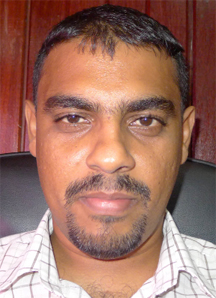Barama Company Limited (BCL) has been able keep profit levels constant for the last two to three years, despite man-made and natural challenges to the forestry sector and to the company itself, according to Mohindra Chand, Head of Corporate Affairs and Forest Planning for BCL.
BCL, one of the longest foreign direct investment initiatives in Guyana and with approximately 1,000 employees, is arguably the largest forest resource and wood products producer in Guyana, whose core business includes the sale of hardwood logs and sawn timber and the manufacturing of plywood, decking and floor products.
According to Chand, the company faces many challenges, which are not always natural. He said that due to continuous logging and the sustainable method of logging adopted by the company, accessing logging sites has become more difficult, and by extension more costly.

He stated, however, that while these issues are important to consider and must be addressed, they are not substantial enough to disrupt the company’s operations. As a result, he explained, BCL has been able to maintain profit levels over the years. He added that the company even plans to invest more in the sector, as well as engage in the harvesting and use of a wide array of lesser used wood species, such as Dakamaballi, Lemonballi, Burada, Monkey Pot and various others.
Chand stated that the company continues to thrive due to the durability and applicability of the tropical wood species it operates with, which have gained international market recognition.
It should be noted that in addition to sawmilling and kiln drying, Barama operates the country’s only veneering and plywood manufacturing facilities. As it relates to the production of plywood, Chand stated that this value-added good is particularly important to the company’s operations, constituting approximately 40% to 50% of the company’s overall revenue.
Robert Persaud, the Minister of Natural Resources and the Environment, said that plywood sales for the year of 2012 are 20% higher than last year’s—a development which has prompted the company to diversify the types of wood usually used in the production process. Chand revealed that the company plans to use several lesser used species in the production of plywood, and while the cost for such an initiative will undoubtedly be substantial, they see it as an important and necessary move.
Additional development includes increased trade with China. Although he was unable to provide figures, Chand stated that since penetrating the Chinese market about 2 years ago, trade in timber products with China has been steadily climbing.
BCL Chief Executive Officer (CEO) Clement Ooi stated that increased company performance over the years has led to the increase tax and royalty payments to the government, which Chand said translates into benefits for Guyana as a whole.
On Thursday, BCL announced that the 1.6 million hectares of tropical forest it manages is now the largest single block of tropical rainforest in the world to be Verified Legal Origin (VLO) Certified.





